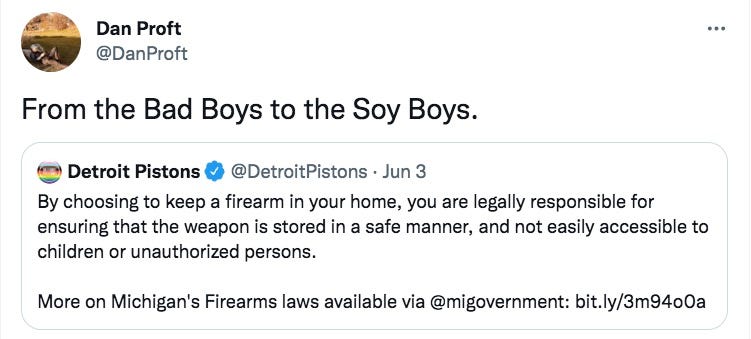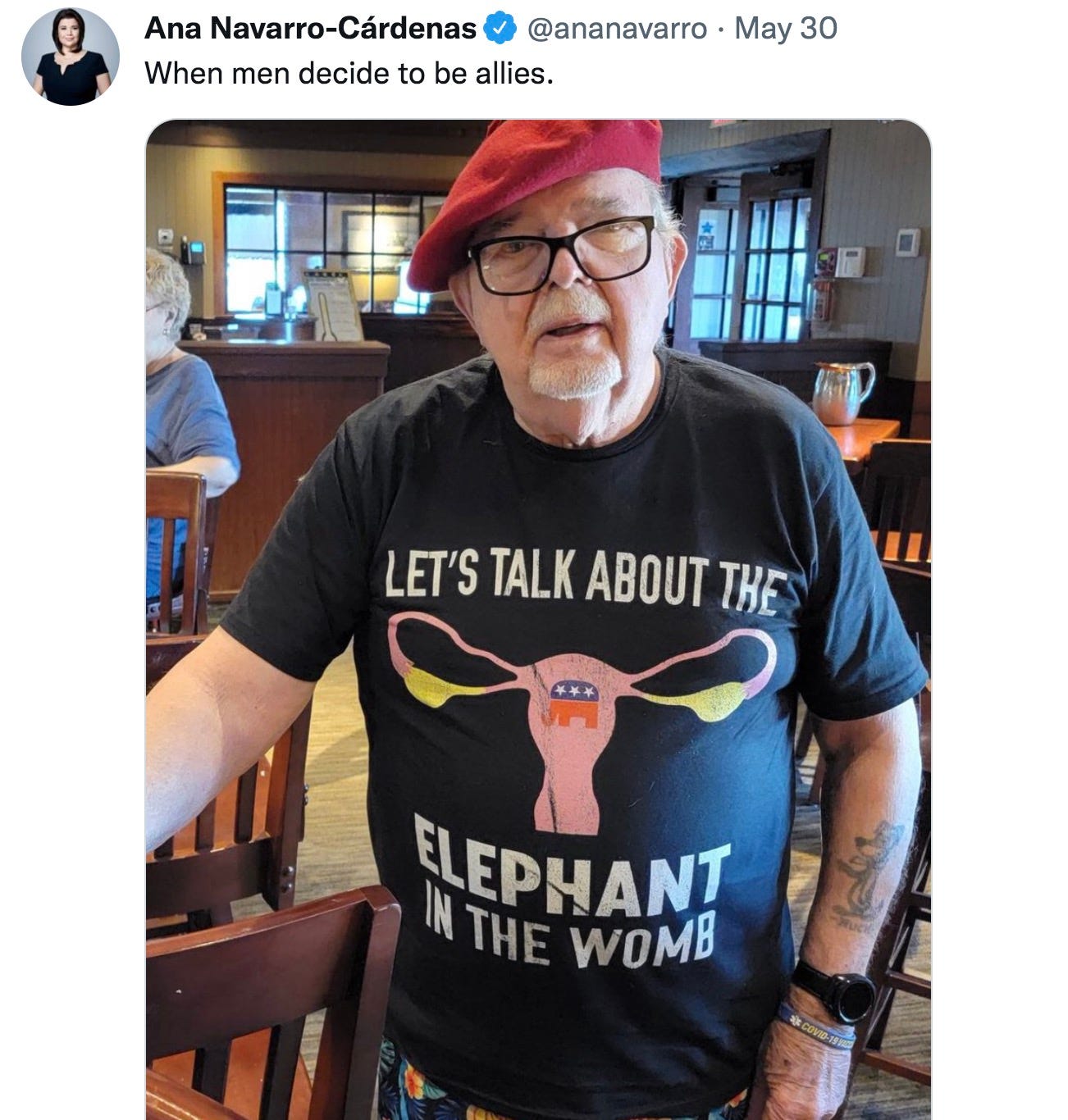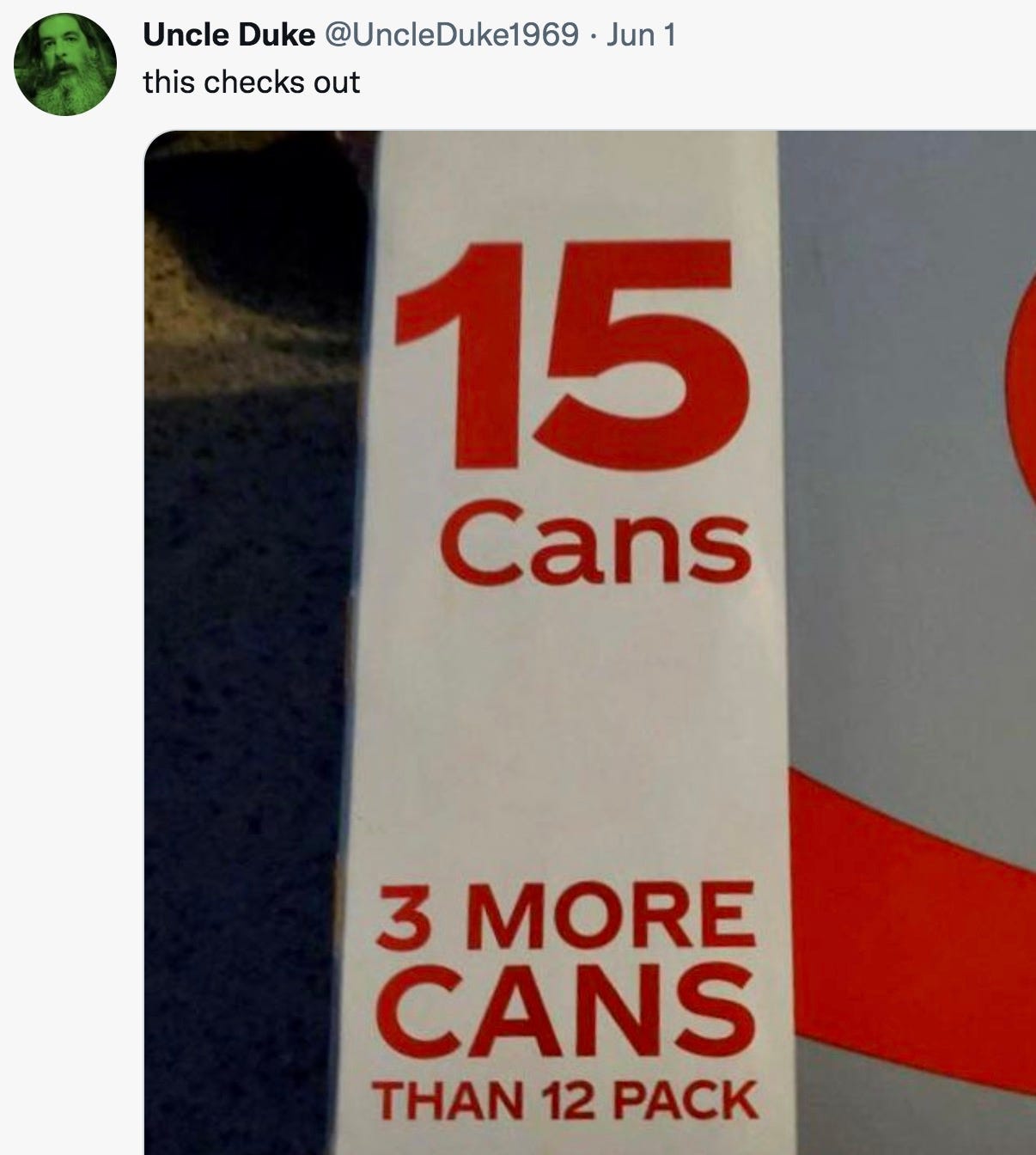Picayune Sentinel Extra: Dan Proft sinks to a new low
& letter writers come to the defense of editorial endorsements
To read this issue in your browser, click on the headline above.
This issue exceeds in size the maximum length for a standard email. To read the entire issue in your browser, click on the headline link above.
Far-right political consultant and local conservative talk-radio gasbag Dan Proft tweeted this Friday afternoon:
A “Soy Boy,” in case you’re not familiar with the slang employed by the putatively hypermasculine right, is an effeminate, weak-willed man. And “Bad Boys,” recall, was the nickname given to the NBA Pistons of the late 1980s and early 1990s due to the team’s rough, even dirty style of play.
So, to unpack this tweet, Proft, the Florida-based morning host on Elk Grove station AM-560 who finished in 6th place out of seven candidates in the 2010 Republican primary for governor, considers advocacy for the safe storage of guns in the home to be emblematic of weakness. Because nothing says high-T more than having your toddler blow his brains out when he finds a loaded pistol in your nightstand.
One of the many flabbergasted commenters under this sickening tweet noted that those girly men at the National Rifle Association have very similar recommendations about gun safety.
In another tweet, Proft, who is backing Darren Bailey for the Republican gubernatorial nomination in the June 28 primary, referred to another candidate in the race, Aurora Mayor Richard Irvin, as a “slithery grifter.” This is a rich accusation indeed from Proft given what we learned in this Tribune news story from 2008:
After helping Cicero's town president win a close election, political strategist Dan Proft received no-bid contracts worth $578,000 a year to serve as the mouthpiece for the town and two local school districts. …Throwing in the $400,000 Cicero pays annually to print and mail the glossy, 36-page town news magazine, the town (of a little less than 84,000 residents) could spend at least $978,000 this year for public relations.
And speaking of slithery, Proft has been in the news lately because Local Government Information Services — a series of highly partisan websites that masquerade as local news sources that he founded — is ground zero for the viral fake news story that distorted changes in school policy at Oak Park River Forest High School.
Notes and comments from readers —lightly edited —- along with my responses
Some of these messages are in reference to items in last Thursday’s Picayune Sentinel.
Mary Ann K. — You wrote about the Lyons Township High School teacher who abruptly resigned because he didn’t agree with new grading policies that included giving students a score of 50 rather than zero for assignments they fail to turn in. I’m a retired teacher and principal and long ago, when I was figuring out grades, I realized that giving zeroes for work not turned in was extremely unfair. Because grades are generally on a 60 to 100 scale, with anything below 60 being a failing grade, a zero can deeply skew the average. Consider if there were just two assignments and the student received 100 on one and didn’t turn in the other, he would fail with an average of 50. Obviously the more assignments one has, the more diluted the zero becomes, but generally there aren’t a ton of assignments each quarter. If the grading scale was 20-100, giving zeroes would make more sense.
He also complained about homework performance not being factored into grades. Homework has always been controversial. I believe its purpose is for the student to practice skills in order to ensure they master concepts. To grade students on practice seems unfair. On the other hand, teachers who assign huge projects as homework without regular teacher input along the way are just piling it on. Homework should be practice, review, or additional time to complete something started in class. Sure, it can be graded, but why? Why not just note that it was turned in or not, and use that information if the final grade is on the bubble?
It is concerning to me to see so many people (many who are males, including you) supporting this teacher’s stance because we need to “prepare our kids” for real life. But I don’t see how sticking to these policies does that. Real life is a lot more complicated and messy than school and its policies. Those who want to do well will continue to do well under most grading policies. Most of those who struggle or are unmotivated do not benefit from punitive measures and more homework.
The purpose of school is to help kids learn. Teachers find ways to help students learn, assess their progress, and evaluate that progress. If a student is not making progress, grading homework and giving zeroes on missing assignments is not going to solve whatever issue it is the student has.
I heard from other educators and my own wife making this same mathematical point: A grade of zero for not turning in a class assignment is drastically unfair when a perfect score is 100. Yet, of course,at the same, it feels absurd to give a student any points at all for doing no work whatsoever. The obvious solution would be to grade on a 50-point scale, so a zero would be equivalent to a grade of “F” and not “J” for averaging purposes.
My experience as an educator is limited to a few years as an adjunct college journalism instructor, but I always saw homework as not simply “practice” for my students but an integral component to mastering skills (which is, itself, in some ways, part of the “practice” rituals that help us master the ability to navigate successfully through life). And human nature being what it is, merely suggesting students perform practice routines outside of class with no consequence for not doing so, would be less effective than the carrot/stick approach of graded homework.
Learning how to organize your time and tune out distractions to complete successfully assigned tasks on time is a vital skill that does require practice for many people. Motivating students to develop that skill seems to me to be a key component of education.
Beyond the basic-skill level, most of education is about learning how to think — how to attack problems, analyze situations, tell good arguments from bad — not about memorizing facts or temporarily mastering talents that will go on to become irrelevant. Exam scores and final grades are proxies for measuring the broader abilities and inchoate promise that will lead to further success, with the obviously imperfect presumption being that those who have exhibited the self-discipline and natural talents to score well will translate those attributes into their higher pursuits.
In a perfect world, of course, there would be no mandatory homework assignments, no quizzes, no tests, no required term papers, no SATs or ACTs — just teachers imparting knowledge and fostering conversations and inquiries that would mold and inspire young minds to self-guided achievement and academic and personal growth.. But since we’re not in a perfect world, the question becomes how best to bring out the best in every student.
I was reminded that, two years ago, KIPP charter school abandoned the slogan “Work hard, be nice” because, “Working hard and being nice is not going to dismantle systemic racism. … It suggests being compliant and submissive (and) … it supports the illusion of meritocracy.”
I would have expanded the slogan rather than abandoned it, since working hard is a necessary but not sufficient element of success in most cases and being nice is usually the way to go in human interactions. Add “pursue justice” or something.
It’s clear, though, that the conversation about how best to evaluate and motivate young learners is ongoing and heated in more places than Lyons Township.
John L. — The Picayune Sentinel gets to take positions. Why shouldn’t other news publications?
The beauty of The Picayune Sentinel is not that I always think, “Boy, that Eric Zorn is a genius.” There are times I disagree. The beauty of it is that it presents arguments, thoughtfully researched and expressed, and in doing so, it makes me think. It involves me in thinking about issues that otherwise may have been off my radar or to think about ideas I otherwise may not have considered. It may even spur me to action (No Mow May?)
The same is true of a good newspaper’s editorials and endorsements.
In an era of negative TV ads, incessant ideological screeching, misinformation and sophisticated political marketing, newspaper endorsements that are thoughtfully researched and constructed provide a refreshing alternative, often with insights I’m not otherwise going to hear. They help me think constructively about my vote.
I agree they have limited influence at the top of the ticket. If I have to read a newspaper’s endorsement to decide who’s going to get my vote for president, I haven’t been doing my job as a citizen. In fact, if that's the case, I haven't even been awake.
But lower down the ballot, they are a helpful – I’d even add “rare” and "extraordinary" – part of the research a citizen can use to meet the obligations we all have to cast informed votes. How many voters are going to have the access, the time or the expertise to fully explore the candidacies or the issues in the races even for offices as significant as Secretary of State or county board, much less for the Water Reclamation District or the library board? It’s not that we as citizens should reflexively embrace the recommendations editorial boards offer — any more than we should just nod without thinking at anything Eric Zorn says — but they are factors to consider along with the other research we should do.
And if along the way, I get exposed to a contrary way of thinking about Gary Johnson or Paul Schimpf -- to consider ideals over pragmatism -- is that really a bad thing?
L’Picayune Sentinel c'est moi, so that’s not a great analogy. I suppose I could choose to write in the third person (“We find Darren Bailey to be a preposterous figure …”), but that would be a bit precious, no?
For down-ballot races I do find the perspective of an editorial board to be helpful, particularly when accompanied by a measured analysis of the race. For higher profile races I’d prefer, as a reader, to read disinterested, duelling columns arguing for certain candidates (which I realize would be difficult in races like Illinois’ First U.S. Congressional District where umpteen Democratic hopefuls are vying to assume the seat long held by U.S. Rep. Bobby Rush).
I find the tradition of anonymous punditry delivered from on high to be odd and outdated. But the next letter writer disagrees:
Jake H. — Keep traditional editorials. They're pithy, non-personal, and tightly argued. The fact that they are unsigned focuses attention on the arguments themselves and away from the person making them. The idea of serving an "institutional voice" raises the stakes for the writer and encourages some degree of collaboration, responsible persuasion, and fidelity to principle.
Editorials are some of my favorite reads of the week. They often give me a quick read on the other side's best arguments, something Eleanor Roosevelt wisely encouraged citizens to do.
Endorsements are particularly useful given our excessive democracy where too many officials are elected rather than appointed. The Tribune isn't my only source on such down-ballot races, but it's an important one. Their choice will probably be reasonable. I have more trust in those endorsements than I do in endorsements by advocacy groups.
I had no idea that columnists were forbidden from making their own endorsements. That strikes me as wrong-headed. Columnists should feel free to contradict -- directly and explicitly -- any view taken by the editorial board. The reader can only benefit from such an exchange of views.
I agree that "institutional voice" is a vestige of the days of the partisan press, a model we have otherwise wisely moved away from ever since the post-WWII years, when, perhaps prodded by television network news that wanted to be in everyone's living room and not just conservatives' or liberals', newspapers adopted more professional standards and embraced objectivity in news reporting. At the same time, on the opinion pages, that institutional voice can anchor presentation of a wide variety of compelling arguments. Editorials remain vital.
As I said, when an editorial advances a point of view with which I am in general agreement, I’m quite happy with the extra (and fairly undeserved) oomph that comes from an institutional proclamation. When I disagree, I react querulously, in part because I know that the paper is leveraging a certain fiction to add weight to the point of view of a handful of people (at most).
“The Chicago Tribune wants federal dollars devoted to fixing potholes” seems a lot more important than “a couple-three opinion writers think federal dollars should be devoted to fixing potholes.”
Robert N. — Will you be making any political endorsements? I think many readers would respect such.
In some races I might explain why I’m voting for a certain candidate, but even the word “endorsement” implies a level of authority and reliability that makes me uncomfortable. To me, endorsing someone or something is to stake your overall credibility on a particular assertion, to stand by it with a certain enthusiasm that lacks the humility and nuance of a recommendation or an expression of personal preference.
The 2014 column that earned me a scolding from on high at the Tribune was headlined “Why I'm voting for Pat Quinn,” which did not contain the E-word and was, I thought, just as valid and just as useful as the Tribune’s endorsement of Bruce Rauner in that race. And, I might add, likely far more representative of the opinions of the journalists in the Tribune newsroom.
It’s possible that I’ll explain why I’m voting for certain candidates when I feel strongly about a particular race.
DancesWithDogs — Keeping uniformed police out of Pride parades is a big mistake. LGBTQ people should recognize the wrong of excluding those who make others feel uneasy. Many Pride parades came about because LGBTQ people either felt excluded or were excluded from many things for many years.
Agreed. It would be a major PR win right now for Pride parade organizers in Aurora and around the country to reverse course and welcome the support and participation of uniformed officers.
Laurence S. — Please don't take this the wrong way. But what you are doing now is much more interesting now than what you were doing when you were with the Tribune.
Thanks, I think. The Substack format allows me to write at exactly the length I want to about many different topics that have caught my attention and to interact in a public forum with readers. It’s more fun and less stressful than composing three columns a week, though so far clearly less impactful. I have a good audience for a newsletter — closing in on 10,000 email recipients a week with decent pass-along rate — but still so far nowhere close to the size of the audience I had when in print and online at the Tribune.
With John Williams: Should audio of Uvalde 911 calls be released?
All the King’s engineers and all the King’s producers have yet to figure out why my remote microphone is so hot. Halfway through Monday’s chat with King John Williams we switched to phone audio. Any sound geeks out there have any advice?
Ya gotta see these tweets!
I often run across tweets that are too visual in nature to include in the Tweet of the Week contest (the template for the poll does not allow the use of images). Here are a few good ones I’ve come across recently:
There’s still time to vote in the conventional Tweet of the Week poll!
Thank you for supporting the Picayune Sentinel. To help this publication grow, please consider spreading the word to friends, family, associates, neighbors and agreeable strangers.





















In response to Mary Ann K... When I was in school, granted that was a long time ago, all of my classes were graded by weighting different types of work. The final might be worth 40%, the mid term 25%, quizes 20% and homework 15%. So if I only turned in 1/2 my homework and got 0 on the other half, it would only cost me 7 1/2%. I always felt that was an easy 100 on 15%, just do the work. Of course I am one of those "many who are males". That was weird...
The greatest shame in my long voting life - I have not missed a single election, anywhere I've lived, since I became eligible to vote - was my vote for Dan Proft in 2010. I'll *never* ever live down that shame.
Worse still: back then, I actually donated $100 to his campaign.